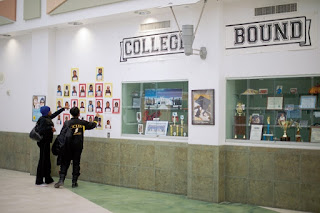I did have some technical difficulties this time around and not all of the pictures that I took were actually captured on my phone... I hope you all will forgive me and that my replacement photos will suffice!
All in all, it was another great meeting. Thanks to University Extension for sponsoring our breakfast!
 |
| Tacos = Good |
 |
| There was also fruit! It looked something like this. |
 |
| Decaf Coffee is the best! Really! |
Kathleen Mabley with Texas Extended Campus kicked off the meeting. Check your email for a Qualtrics survey that her office sent out to get more feedback about advisor engagement with UEX.
Next up was Katy Redd with the Counseling and Mental Health Center (CMHC). She walked us through the new Thrive app for iPhones that the CMHC has developed.
The app looked really cool! Each topic had a quote, a video of a UT student discussing a challenge, an activity, and personalized feedback.
 |
| Everyone loves a good quote! |
 |
| One of the topics you can work through on the Thrive app |
Dian Rudd, also with CMHC, discussed recognizing and supporting students in crisis. I am very sorry to report that none of the pictures I took of Dian were saved on my phone! But thank you to Dian for coming to speak with us!
Elizabeth Krieg was next representing UT Staff Council. They are holding a professional development fair on March 23rd in FAC 328 from 11:30 to 1:30. Stop by to see all of the great opportunities UT has for developing professionally.
 |
| UT Staff Council! |
Sarah McKay and Cindy Gladstone recognized the recipients of our wonderful nominees for the NACADA Outstanding Advising Awards.
Outstanding Advising Program Award: BBA Academic Advising Program – McCombs School of Business
Outstanding New Advisor Award – (Primary Role): Thomas Fawcett, Senior Academic Advisor – College of Liberal Arts
Outstanding Advising Award - (Primary Role): Jackie Salcedo, Undergraduate Academic Advisor, Graduate Coordinator, Course Schedule – College of Liberal Arts
We closed the meeting with kudos and announcements. Thanks to everyone for coming. See you next month!
And I hope you got to check out the great promotional materials the CMHC brought for us. They had some excellent stickers!
Kudos for this month:
From Jeff Mayo and Josephine Bibby
Thank you to everyone who attended the ACC to UT Marketplace in February! We got the opportunity to talk to over 100 ACC students who are interested in becoming Longhorns. Without the participation of UT advisors and support staff, we would not be able to reach these students and it's so appreciated!
From Tisha Monsey
Kudos to Eric Carter and the rest of the Professional Development Day team for taking PDD to a whole new level! The website and app were so useful, and I enjoyed having the opportunity to get off-campus away from work distractions to focus on professional development. You took risks and really spiced things up!
From Desiree Alva
Shout out to all of the wonderful advisors who helped make Spring Orientation a success and props to those gearing up for the next round of orientations!
From Lovelys
Big KUDOS! to the co-chairs for Professional Development Day (Eric Carter, Sarah Talley, Emily Schroeder, and Mary DeSopo), as well as the committee and volunteers who put on one of the best PDDs I've attended. Cheers!
Kudos to Veronica Vasquez, Antoinette Stanley, Richard Hogeda and Sherry Field for hosting an informal lunch discussion on retention issues. It was a very relaxed forum to begin a general discussion and to find ways to share for the benefit of all our students.
Kudos to Jay Guevara for attending the First Year Experience conference in Orlando and finding ways to share what you learned.
Kudos to the attendees of PDD who took the time to complete sessions surveys and provide constructive feedback. PDD is a great learning forum for speakers to present ideas in a safe environment and it is made better knowing that our colleagues care enough to try to help us improve for the future. Cheers!
Kudos to Kelsey for doing such a wonderful job in her role as Historian. I love your blog entries and I super-duper love the Kudos idea!
Kudos to Blake Willms - ACA Communications Coordinator - for rolling out the new ACA website to fit the university template. I look forward to your continued efforts in making our website a helpful resource for UT staff. Cheers!
From Andrea Gonzalez
A MASSIVE KUDO to the PDD committee for providing the attendees a comfortable forum to engage in thought and growth, while talking with staff we may or may not typically talk with. It takes effort to force yourselves to talk through all of the details and stamina to pull it all off. You did a great job and I appreciate it!
From Anonymous
Congratulations Ashley Clark on a great presentation at NACADA Region 7!













